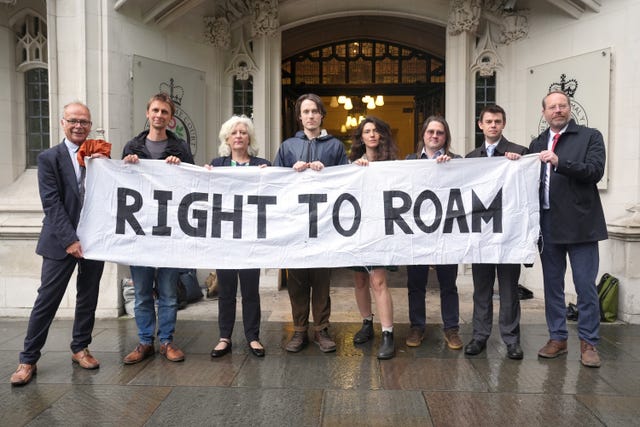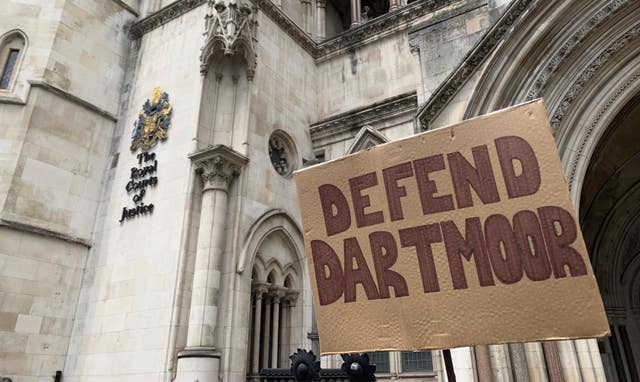Public has the right to wild camp on Dartmoor, Supreme Court rules
Five justices unanimously dismissed a legal challenge by two landowners, who claimed that the law did not allow camping.

The public does have the right to wild camp on Dartmoor, the Supreme Court has ruled.
Five justices unanimously ruled on Wednesday that the term “recreation” in the law governing the use of the national park in Devon is used “without qualification as to the form which it should take”.
Two landowners, Alexander and Diana Darwall, had challenged a Court of Appeal ruling at the UK’s highest court, which said the law allows the public to camp on the Dartmoor Commons, provided bylaws are followed.
Mr and Mrs Darwall keep cattle on Stall Moor, which forms part of their more than 3,450-acre estate in the southern part of the national park.
The case concerned the interpretation of the Dartmoor Commons Act 1985, which says “the public shall have the right of access to the commons on foot and on horseback for the purpose of open-air recreation” on the commons.
Their lawyers told the Supreme Court last October that some campers cause problems to livestock and the environment, and that the law only gives the public access on foot and horseback, “which naturally means walking and riding”.

The Dartmoor National Park Authority (DNPA) opposed the challenge, with its lawyers labelling the suggestion that erecting a tent could damage land and vegetation “absurd”.
In their judgment, Lords Sales and Stephens said the law would make “no sense” if the right of recreation given to the public was “limited in the manner contended for” by the Darwalls, and that the concept of “open-air recreation” was “wide”.
They said in a ruling backed by Lord Reed, Lady Rose and Lady Simler: “The word ‘recreation’ is used here without qualification as to the form which it should take.
“It is not confined to recreation taken by means of walking or riding.”
Dartmoor National Park, designated in 1951, covers a 368-square-mile area which features “commons” – areas of unenclosed, privately-owned moorland where locals can put livestock.
In January 2023, High Court judge Sir Julian Flaux ruled that the 1985 Act did not allow people to pitch tents overnight on the Dartmoor commons without landowners’ permission.

But campaigners argued the decision “went too far” and was a “huge step backward”, and could affect bird-watching, fishing and other activities.
The Court of Appeal overturned the decision in July that year after a challenge by the DNPA, with three senior judges ruling that the law “confers on members of the public the right to rest or sleep on the Dartmoor commons, whether by day or night and whether in a tent or otherwise”.
Sir Geoffrey Vos said in the judgment that the “critical question” was whether wild camping could be considered a form of “open-air recreation”, finding it was.
In written submissions for the Supreme Court hearing last year, Timothy Morshead KC, for the Darwalls, said the couple are “not motivated by a desire to stop camping on Dartmoor”.
But he said: “Concerns arise from their responsibilities as stewards of the land in their ownership and over which they have commoners’ rights: concerns about the damage that wild camping can cause and, in particular, about the significant risk of fire associated with it.”
But barristers for the DNPA said the phrase “on foot” means “the access to the commons should be pedestrian and not vehicular”.
In written submissions, Richard Honey KC said: “The suggestion that merely erecting a tent for backpack or wild camping damages the land and vegetation is absurd.”
Lord Sales and Lord Stephens said in their ruling that the term “open-air recreation” should be read widely, because otherwise it would “create an unjustified and unrealistic limit on the park authority’s power to repair damage on the commons”.
They continued: “Whilst there are restrictions on the landowners’ property rights, there is in return DNPA’s power to prevent, and enforce against, problematic camping by virtue of its ability to make and enforce bylaws and to publish notices.
“Accordingly, the legislation puts in place the means for public regulation of use of the commons which is in practice likely to be more effective in protecting the land than attempts by private persons to challenge such use through themselves having to confront people on their land and then bring a claim in private law.”





